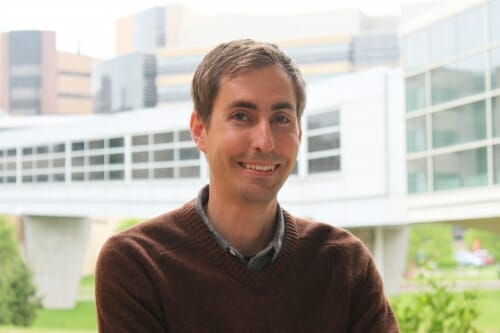New Faculty Focus: Cody Wenthur
Name: Cody Wenthur
Title: Assistant Professor, School of Pharmacy
Hometown: Cedarburg, Wis.
Educational/professional background: Pharm.D., Purdue University, 2011; Ph.D., Vanderbilt University, 2015; Postdoctoral Fellow, The Scripps Research Institute – La Jolla, California.
How did you get into your field of research? My research into the neuropharmacology of psychiatric illnesses arose from a combination of academic curiosity and personal experience. When I was first considering a career path to pursue in college, I was fascinated with the concept that relatively simple small psychoactive molecules can act to provoke dramatic changes in human perception and behavior, either for good or for ill. However, I wasn’t quite comfortable with the idea of pursuing this somewhat remote academic interest without concern for the reality around me — the most common and obvious behavioral change that psychoactive drugs were causing was addiction, often with devastating consequences for the health of individuals, families, and communities.
With this in mind, I eventually decided to pursue both clinical and academic training in pharmacology, so that I might have a chance to not only understand these powerful tools for altering human behavior, but then leverage this understanding of their mechanisms to generate or implement better methods for improving mental health and well-being.
What attracted you to UW–Madison? As a researcher exploring questions at the interface between chemistry, pharmacology, and neuroscience, I was thrilled that this one campus had a rare combination of a complete array of exceptional benchtop science departments, excellent clinical research facilities, and a dedicated, world-class center for translational research, all within easy reach of my academic home in the School of Pharmacy.
What was your first visit to campus like? Cold, yet comforting. As a native Wisconsinite, it wasn’t surprising that my campus hosts were all incredibly warm and welcoming, even while the January temperatures were freezing. It felt like coming back home.
Favorite place on campus? I’m not sure if it is technically a campus building, but being invited to the chancellor’s house for the New Faculty Welcome Picnic was a very nice introduction to the university, and the landscaping there was beautiful. If that doesn’t count, then I’ll say the Lakeshore Path, since it is a great way to make a cross-campus commute feel like a mini-vacation.
What are you most enjoying so far about working here? The people are incredible, and the sheer diversity of ideas and work that get accomplished here is astounding. It is always fantastic to work in a place where you can sense that everyone is trying to elevate and support the community around them.
Do you feel your work relates in any way to the Wisconsin Idea? The opioid overdose epidemic, which serves as a particularly stark reminder of the high prevalence of substance use disorders across all populations, has certainly not spared Wisconsin. Communities around the state and the entire country are working together to generate effective solutions to try and reverse the course of this fatal problem; I think that the most immediate impact of my work here at UW–Madison will be the education of new pharmacists, who need to be on the front lines for implementation of these solutions.
Ultimately, because this crisis is only one facet of the globally limited access and sub-optimal treatment of substance use disorders and psychiatric illnesses in general, I hope that my research will also reach beyond the borders of campus by influencing the future treatment landscape for these diseases.
What’s something interesting about your area of expertise you can share that will make us sound smarter at parties? One of the experimental ways that researchers are looking to treat addiction is with vaccines (also called immunopharmacotherapies, depending on how smart you are trying to sound). The idea with these vaccines is that you could temporarily induce protective antibody production against an abused drug for a person in recovery. These antibodies would provide a period of a few months or years where they could not feel the full rewarding effects of the drug in the event of a relapse, hopefully preventing a full remission during this critical early period of abstinence.
Hobbies/other interests: Hiking, sailing, skiing, musical composition, (ice) golf

